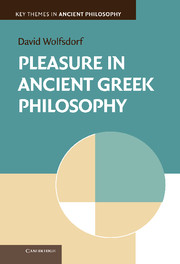Book contents
- Frontmatter
- Contents
- Acknowledgments
- Chapter 1 Introduction
- Chapter 2 Pleasure in early Greek ethics
- Chapter 3 Pleasure in the early physical tradition
- Chapter 4 Plato on pleasure and restoration
- Chapter 5 Plato on true, untrue, and false pleasures
- Chapter 6 Aristotle on pleasure and activation
- Chapter 7 Epicurus and the Cyrenaics on katastematic and kinetic pleasures
- Chapter 8 The Old Stoics on pleasure as passion
- Chapter 9 Contemporary conceptions of pleasure
- Chapter 10 Ancient and contemporary conceptions of pleasure
- Suggestions for further reading
- General Index
- Index of Greek and Latin Words and Expressions
- Index of Quotations from Ancient Authors
- Index of Quotations from Contemporary Authors
- References
Chapter 8 - The Old Stoics on pleasure as passion
Published online by Cambridge University Press: 05 December 2012
- Frontmatter
- Contents
- Acknowledgments
- Chapter 1 Introduction
- Chapter 2 Pleasure in early Greek ethics
- Chapter 3 Pleasure in the early physical tradition
- Chapter 4 Plato on pleasure and restoration
- Chapter 5 Plato on true, untrue, and false pleasures
- Chapter 6 Aristotle on pleasure and activation
- Chapter 7 Epicurus and the Cyrenaics on katastematic and kinetic pleasures
- Chapter 8 The Old Stoics on pleasure as passion
- Chapter 9 Contemporary conceptions of pleasure
- Chapter 10 Ancient and contemporary conceptions of pleasure
- Suggestions for further reading
- General Index
- Index of Greek and Latin Words and Expressions
- Index of Quotations from Ancient Authors
- Index of Quotations from Contemporary Authors
- References
Summary
Insofar as we are interested in the Stoic conception of pleasure, we are dealing with a school of thought – as we did in the case of the Cyrenaics – rather than with a single figure such as Plato, Aristotle, or Epicurus. Stoicism endured much longer than Cyrenaicism. In fact, it was the dominant philosophical outlook of the Greco-Roman world from about the third century bce until about the third century ce.
Through these 600 odd years, there was a great deal of continuity among Stoic philosophers. In general, members of the school desired to adhere to the positions of their founders. Inevitably and understandably, however, there were also adjustments, disparities, and renunciations. This applies to the Stoic conception of pleasure as well as to other areas of their thought. Here we focus on the foundational position.
The foundations of Stoic philosophy, normally referred to as the philosophy of the “Old Stoa,” are identified with the views of the first three successive heads of the school: Zeno of Citium (334–262), Cleanthes of Assos (331–232), and Chrysippus of Soli (279–206). Unless otherwise indicated, I will hereafter use “Stoic” to mean “Old Stoic.” Generally, it is agreed that the philosophy of the old Stoa receives its most refined form in the work of Chrysippus. Thus, much of what passes for Stoic philosophy is the philosophy of Chrysippus. For reasons that will become clearer as we proceed, however, the Old Stoic conception of pleasure that we will be discussing cannot or should not straightforwardly be identified as Chrysippus’. Here we can note at least two reasons for this. First, there may be disparities between Zeno and Chrysippus. Second, since a significant portion of Chrysippus’ conception of pleasure derives from Zeno and since we can to some extent specify Zeno’s contribution, we should appreciate originality where it is due. For convenience, I will refer to the “Stoic conception of pleasure,” but now we should understand that this conception itselfmight not have been unified.
- Type
- Chapter
- Information
- Pleasure in Ancient Greek Philosophy , pp. 182 - 213Publisher: Cambridge University PressPrint publication year: 2012



